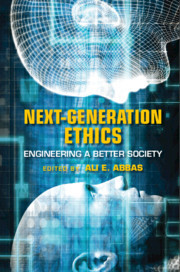Description
Next-Generation Ethics
Engineering a Better Society
Coordinator: Abbas Ali E.
Leaders from academia and industry offer guidance for professionals and general readers on ethical questions posed by modern technology.
Language: English
Subject for Next-Generation Ethics:
Next-Generation Ethics
Publication date: 11-2019
474 p. · 15.3x22.8 cm · Paperback
Publication date: 11-2019
474 p. · 15.3x22.8 cm · Paperback
Next-Generation Ethics
Publication date: 11-2019
484 p. · 14.6x23.5 cm · Hardback
Publication date: 11-2019
484 p. · 14.6x23.5 cm · Hardback
Description
/li>Contents
/li>Biography
/li>
Many of the significant developments of our era have resulted from advances in technology, including the design of large-scale systems; advances in medicine, manufacturing, and artificial intelligence; the role of social media in influencing behaviour and toppling governments; and the surge of online transactions that are replacing human face-to-face interactions. These advances have given rise to new kinds of ethical concerns around the uses (and misuses) of technology. This collection of essays by prominent academics and technology leaders covers important ethical questions arising in modern industry, offering guidance on how to approach these dilemmas. Chapters discuss what we can learn from the ethical lapses of #MeToo, Volkswagen, and Cambridge Analytica, and highlight the common need across all applications for sound decision-making and understanding the implications for stakeholders. Technologists and general readers with no formal ethics training and specialists exploring technological applications to the field of ethics will benefit from this overview.
1. Next-generation ethics: an introduction Ali E. Abbas; 2. Ethical distinctions for building your ethical code Ronald Howard; Part I. Technology: 3. Composite ethical frameworks for IoT and other emerging technologies Max Senges, Patrick S. Ryan and Richard S. Whitt; 4. Ethics of immersive technologies Randall W. Hill, Jr; 5. Internet, technology, and the future: an interview with Vint Cerf Vint G. Cerf and Ali E. Abbas; 6. A Hippocratic Oath for technologists Ali E. Abbas, Max Senges and Ronald Howard; 7. Data, privacy, and the greater good Eric Horvitz and Deirdre Mulligan; 8. Guidelines for artificial intelligence containment James Babcock, Janos Kramar and Roman V. Yampolskiy; Part II. Business Enterprises: 9. Next-generation business ethics: the impact of artificial intelligence Kirk O. Hanson; 10. Big data privacy, ethics, and enterprise continuous monitoring systems Daniel E. O'Leary; 11. How management theories and culture fads kill organizational ethics Marianne M. Jennings; 12. How next-generation teams and teaming may affect the ethics of working in teams Scott S. Wiltermuth and Alyssa J. Han; 13. Transparency: the what, why, and how of organizational effectiveness and ethics James J. O'Toole; 14. Global engagement by leaders is a moral imperative: building the next generation of ethical corporate cultures Marsha Ershaghi Hames; Part III. Engineering: 15. The whistle that was not blown: WV, diesels and engineers Michael Davis; 16. Addressing corruption in our global engineering/construction industry William P. Henry; 17. Ethics issues facing engineers in oil and gas operations Iraj Ershaghi; 18. Engineering codes of ethics: legal protection and empowerment for engineers Jeffrey H. Matsuura; 19. Engineering ethics when lives are on the line: when does bad engineering become bad ethics? Neil G. Siegel; 20. Case studies of product life cycle environmental impacts for teaching engineering ethics Matthew J. Eckelman, John Basl, Christopher Bosso, Jacqueline Isaacs and Kathleen Eggleson; Part IV. Society: 21. Next generation ethical issues: engineering, business, medicine, and public policy James Ellis, Laura Mosqueda, Jack Knott and Yannis Yortsos; 22. Techno innovations: the role of ethical standards, law and regulation and the public interest Frank V. Zerunyan; 23. Evolutionary ethics: a potentially helpful framework in engineering a better society John N. Celona; 24. Topics in next-generation medical ethics: the art in the art of medicine Josh H. Hyatt; 25. Next-generation ethical development of medical devices: considering harms, benefits, fairness, and freedom Andrew O. Brightman, Jonathan Beever and Michael Hiles; 26. Looking back to go forward: the ethics of journalism in a social media age Glenda N. Cooper; 27. Social media ethics 2.0 Jeremy H. Lipschultz; 28. AI people and society Eric Horvitz; 29. Ethics in cyberspace: freedom, rights, and cybersecurity Richard A. Spinello; 30. Next-generation religion and ethics Varun Soni.
Ali E. Abbas is Professor of Industrial and Systems Engineering and Public Policy at the University of Southern California, where he also directs the USC Neely Center for Ethical Leadership and Decision Making. His research focuses on decision analysis, multiattribute utility theory, and ethical decision-making, and he is the recipient of multiple awards from the National Science Foundation for his work. Dr Abbas has authored numerous books, including Foundations of Multiattribute Utility (Cambridge, 2018) and Foundations of Decision Analysis (2015) with co-author Ronald A. Howard. He is also co-editor of numerous edited volumes, including Improving Homeland Security Decisions (Cambridge, 2017).
© 2024 LAVOISIER S.A.S.

